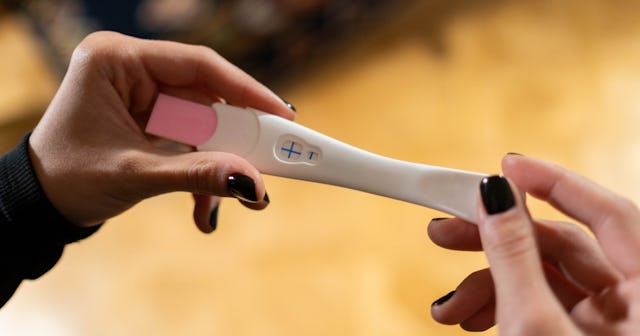Not Sure When To Take a Pregnancy Test? This Calculator Will Help

Whether you’re trying to conceive, or crossing your fingers that you’re not pregnant, taking a pregnancy test can cause some anxiety. There are so many questions, like when, exactly, to take a pregnancy test, and whether it’s possible to calculate the percentage of the possibility that you’re pregnant. Sure, you could be on the lookout for early pregnancy symptoms, but that’s not the same as actually taking a test. And if you do take a test, is a urine test in the comfort of your own bathroom as accurate as a blood test?
RELATED: These Are The Four Menstrual Cycle Phases You Should Know About
So many questions! But first, let’s take a moment to thank the lucky stars you live in an age when one can pee on a digital smart stick that offers a resounding “pregnant” or “not pregnant.” It wasn’t always this way. The history of homemade pregnancy tests is wild and often unsafe, including everything from the innocuous barley, sugar, toothpaste, and baking soda tests, to the highly questionable and dangerous bleach test.
Alright, so you’re all set with a pregnancy test. What now? Tools like due date calculators and gender predictors already exist, but what about a calculator to help you determine when to take a pregnancy test? Well, that’s a thing too. Here’s what to know.
RELATED: 8 Pregnancy Tests That Give You Accurate, No-Bullsh*t Results And Don’t Cost A Fortune
How soon will a pregnancy test read positive?
For many people, their first question is how many days after having unprotected sex can pregnancy be confirmed by a urine test. But for multiple reasons, that question isn’t as straightforward as it seems. First of all, it depends on the point of your ovulation cycle you were in when you had sex. And on top of that, not everyone has the same regular ovulation and menstrual cycles, so the timing of when a pregnancy test will read positive can differ from person to person. And remember: this is the soonest a pregnancy test would be positive, and, depending on the concentration of your hormone levels, may end up showing as a negative initially but later read positive, according to Verywell Family.
What time of day should you take a pregnancy test?
Though you can take a pregnancy test at any time of day, they tend to be more accurate in the morning, according to a 2011 study published in the journal Clinica Chimica Acta. This is because at-home pregnancy tests detect the hormone human chorionic gonadotropin (hCG) in your urine, and unless you make frequent trips to the bathroom throughout the night, your pee is likely most concentrated first thing in the morning, before you dilute it by drinking water or other fluids.
When should you take a pregnancy test after missing a period?
The best — and most accurate — time to take a pregnancy test is immediately after missing a period, because, as the U.S. Food and Drug Administration points out, this will help you avoid both false negatives and the false positives of what may be very early miscarriages.
So why is taking a pregnancy test right after you’ve missed a period the best option? As the Mayo Clinic explains, once a fertilized egg is implanted in the uterine lining, the placenta starts to form, and your body begins to produce hCG, which enters your bloodstream and urine. When someone first becomes pregnant, their hCG levels are low, but they double every two to three days, meaning that the earlier you take a home pregnancy test, the more difficult it might be for it to detect hCG.
But what about those pregnancy tests that are marketed as being “early” and able to detect pregnancy before a missed period? In short, their accuracy is questionable. These tests are based on the assumption that everyone has a 14-day luteal phase — which isn’t universally the case, according to a 2017 study published in the journal Fertility & Sterility. As great as it would be to have the results sooner rather than later, you’re better off waiting until you’ve missed a period and then taking the test.
What is a conception calculator?
Have you wondered when your little nugget was conceived? Well, a conception calculator helps you figure that out. Whether you’re trying to have a baby or avoid it, this is a great tool to use. A conception calculator lets you know the range of days a woman is most likely to conceive. You can use your due date, the date on your ultrasound, or your last period.
Click here to figure out your own conception date(s).
How do you self-check your stomach for pregnancy?
The most accurate way to tell if you’re pregnant is to take a pregnancy test. But if you think you might have a bun in the over, your best bet is to have it confirmed by an obstetrician. Unless you have medical training, it’s nearly impossible to confirm an early pregnancy with an external self-exam. However, some women also report feeling abdominal cramps in their stomachs like pinching, pulling, or stretching. It could be a sign of pregnancy, upcoming period, or gas. Ultimately, if you think you might be expecting, make an appointment with your doctor to make sure.
How does pregnancy discharge look like?
Pregnant or not, discharge is totally normal. However, when you’re pregnant, you’ll experience a lot more discharge because of the increase in estrogen and blood flow. The discharge will be much more noticeable and is usually more watery. It’s still milky white, thinner and odorless.
This article was originally published on